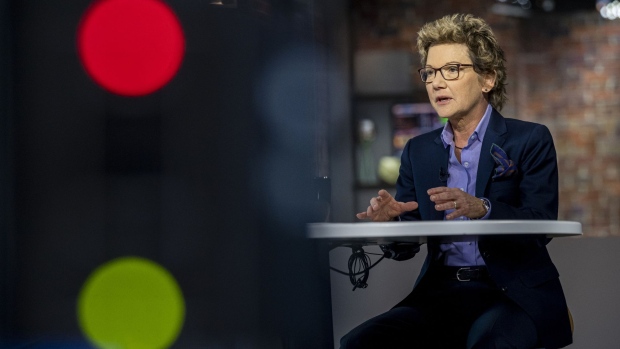Sep 29, 2022
Fed’s Daly Says Deep Recession Not Needed to Curb High Inflation
, Bloomberg News

(Bloomberg) -- The Federal Reserve is committed to raising interest rates until it restores price stability and should try to do so in a manner that avoids a difficult downturn, said San Francisco Fed President Mary Daly.
“Resolute to our goals, the Fed has raised the benchmark interest rate rapidly this year, and projects additional increases will be needed,” Daly said Thursday in prepared remarks at Boise State University in Idaho. “These are necessary and appropriate adjustments, taken to put the economy back on a solid footing.”
Daly, who has echoed her central bank colleagues in vowing to keep raising interest rates in order to cool demand, repeated concerns she raised earlier this week about tightening policy too much, and the implications that could have for the US economy. She said the costs of both doing too little, which could allow inflation expectations to increase, and too much, which could cause an “unnecessary and painful downturn,” are high.
‘Resolute Commitment’
“Inducing a deep recession does not seem warranted by conditions, nor is it necessary to achieve our goals.,” Daly said. “Successful policy will require vigorous analysis, extreme data dependence, and a resolute commitment to delivering on our mandate.”
In a speech titled “The Singularity of the Dual Mandate,” Daly said the Fed’s two goals -- price stability and maximum employment -- are intertwined and that characterizing these as trade offs is not the right way to look at the Fed’s mission. The two parts of the mandate are the foundation to economic security, she said.
“Seen in this light, the Federal Reserve actually has a singular purpose: to keep the economy on a sustainable path by delivering low, stable prices and durable labor market strength,” Daly said.
Some critics of the Fed’s rapid policy tightening, which has seen interest rates increase by 3 percentage points this year, have accused policymakers of abandoning their employment mandate for a sole focus on inflation.
“Navigating the economy toward a more sustainable path necessitates higher interest rates and a downshift in the pace of economic activity and the labor market,” Daly said. “But for now, inducing a deep recession does not seem warranted by conditions, nor is it necessary to achieve our goals.”
©2022 Bloomberg L.P.





